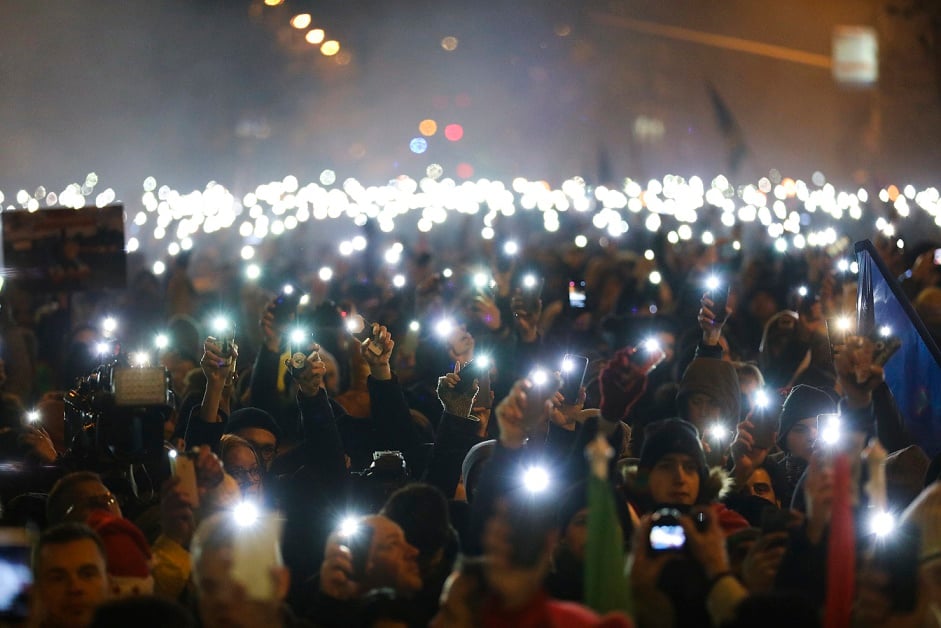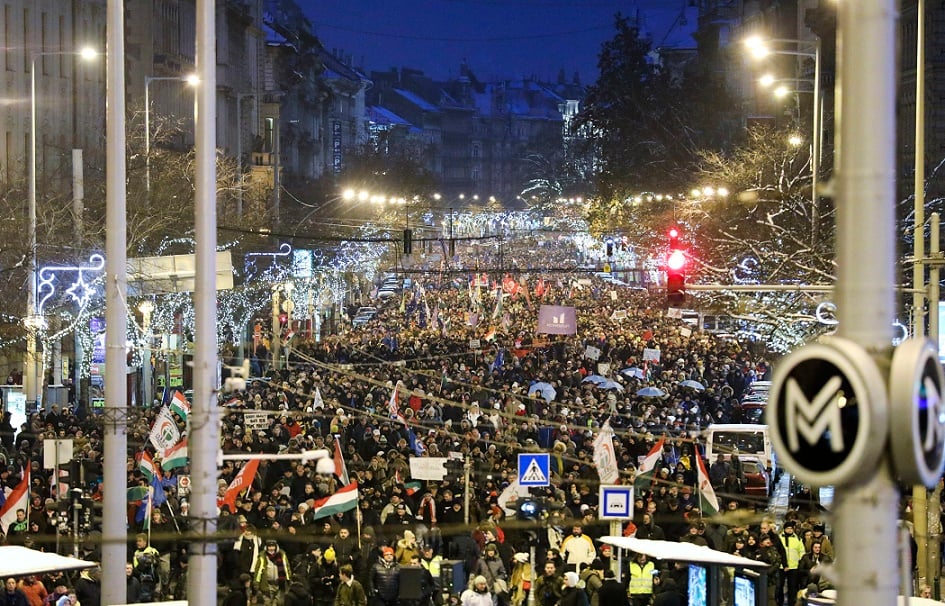(CN) – A season of fierce protests in Europe has hit Budapest, the capital of Hungary and seat of government of Viktor Orban, a far-right nationalist president who has openly slammed the European Union as a model of liberal democratic politics.

On Sunday, about 15,000 protesters braced subzero temperatures and took to the streets of Budapest. Protests against Orban's government have been growing since the passage of new laws on Wednesday, including one that makes it legal for employers to demand workers do 400 hours of overtime a year and another law that establishes a separate government-controlled court system.
Sunday's protests led to opposition politicians staging a protest on Monday inside the state television headquarters, demanding that their voices and complaints be heard. Videos showed opposition politicians being dragged out of the building by security guards.
The protests in Budapest were mirrored in Paris over the weekend where anti-government protesters, the so-called “yellow vests,” held a fifth weekend of demonstrations. Meanwhile, thousands of far-right, anti-immigrant protesters clashed with police in Brussels too.
It's been quite a month for Orban. In mid-November, Hungary whisked Nikola Gruevski, a former Macedonian prime minister set to spend two years in prison for corruption, across its borders and gave him asylum. Orban called him a political ally in need of protection. The incident raised tensions with NATO because Gruevski is viewed as an ally of Russia.

At the beginning of December, a Budapest university founded by Hungarian-American philanthropist billionaire George Soros, the Central European University, closed its doors under relentless legal and political pressure by Orban. Orban and the pro-government media in Hungary have vilified Soros as a liberal political force seeking to undermine Hungary's government and open its borders to immigrants and asylum-seekers.
Then last week his government passed the new overtime rules– dubbed by protesters as the “slave law” – and the new administrative court system which will be overseen by the Ministry of Justice. The new courts are viewed as eroding the separation of powers between the judicial and executive branches.
Orban represents one of the EU's most vexing and complex problems and the past month has shown how he appears able to thumb his nose at the EU without concern about repercussions.
“Orban’s message to the world is that his government does not care about pressure from the EU, the European Commission, Germany or even from the United States,” Peter Kreko, the director of the Political Capital Institute, a think tank in Budapest, said on Twitter recently.
He's been a challenge for European ideals since his Fidesz Party seized control of Hungary in 2010. He won a third presidential term in April and Fidesz holds about two-thirds of the seats in the national assembly.
Orban's government became a controversial force in 2015 when it erected fences along its borders to stop asylum-seekers and immigrants from crossing into the EU.
His administration has also passed a slew of controversial laws restricting free press, academic freedom and the independence of the judiciary.
This year, Orban’s government made it a crime to help immigrants and asylum-seekers, a measure meant to hinder the work of non-government groups that help asylum-seekers obtain legal status.
In October, being homeless became effectively illegal in Hungary. The government is also looking at banning the smoking of tobacco for anyone born after January 2020.
Orban has been called Europe's dictator-in-the-making and is routinely lambasted for advocating nationalist, illiberal, anti-immigrant and pro-Christian politics.
“Workers' rights, the freedom of press and an independent judiciary are incontestable in the European Union,” said Udo Bullmann, the leader of the Socialists and Democrats in the European Parliament, in a statement Monday. “Orban must steer his country back onto a democratic path.”
Orban also represents a serious problem for Europe's dominant political party in the European Parliament, a coalition of conservative parties called the European People's Party. Many of Europe's most powerful leaders, including German Chancellor Angela Merkel, belong to the EPP. Orban, too, is a member. Political opponents often blast the party for keeping Orban in its ranks.
The European Parliament initiated sanctions proceedings against Hungary in September over allegations of anti-democratic actions by Orban’s government.
But it is likely sanctions will fail because under EU laws, they must be approved unanimously and Poland – which is also facing sanctions over similar charges of creeping authoritarianism – has vowed to block them.
Orban enjoys widespread support across Hungary, where nationalism is on the rise. Still, the protests in Budapest pose a challenge for him. The protests were some of Hungary's largest in years, media reports said.
The protests on Sunday saw support from a wide range of people, from the left and right of the political spectrum. For example, some protesters flew flags for the Jobbik party, a far-right nationalist party that has rivaled Orban's Fidesz. Elsewhere, a protester held a sign reading: “All I want for Xmas is democracy.” They said they needed to show their discontent with the government.
Protesters clashed with police at times and the authorities reportedly used teargas against some of them.
(Courthouse News reporter Cain Burdeau is based in the European Union.)
Subscribe to Closing Arguments
Sign up for new weekly newsletter Closing Arguments to get the latest about ongoing trials, major litigation and hot cases and rulings in courthouses around the U.S. and the world.








